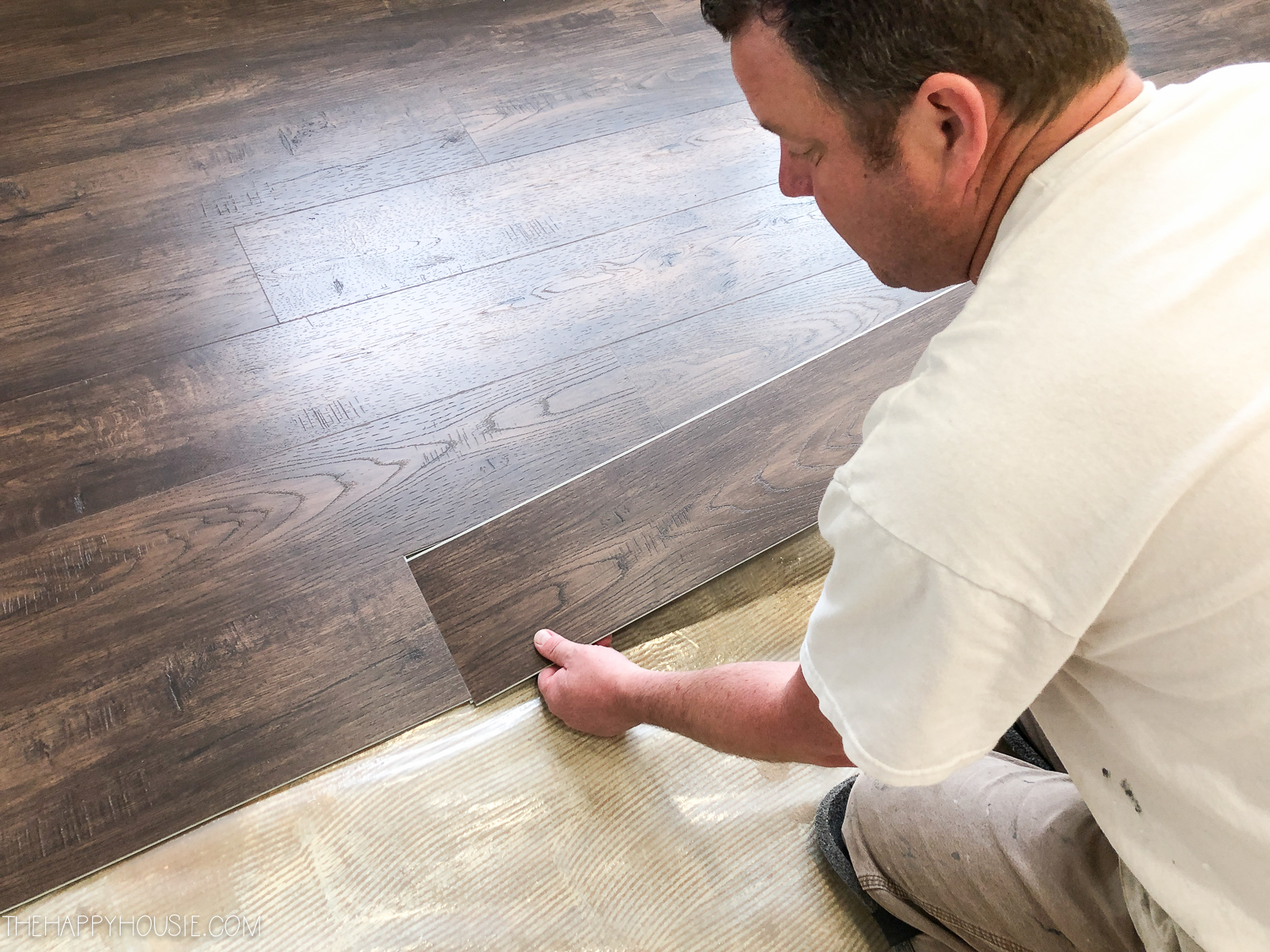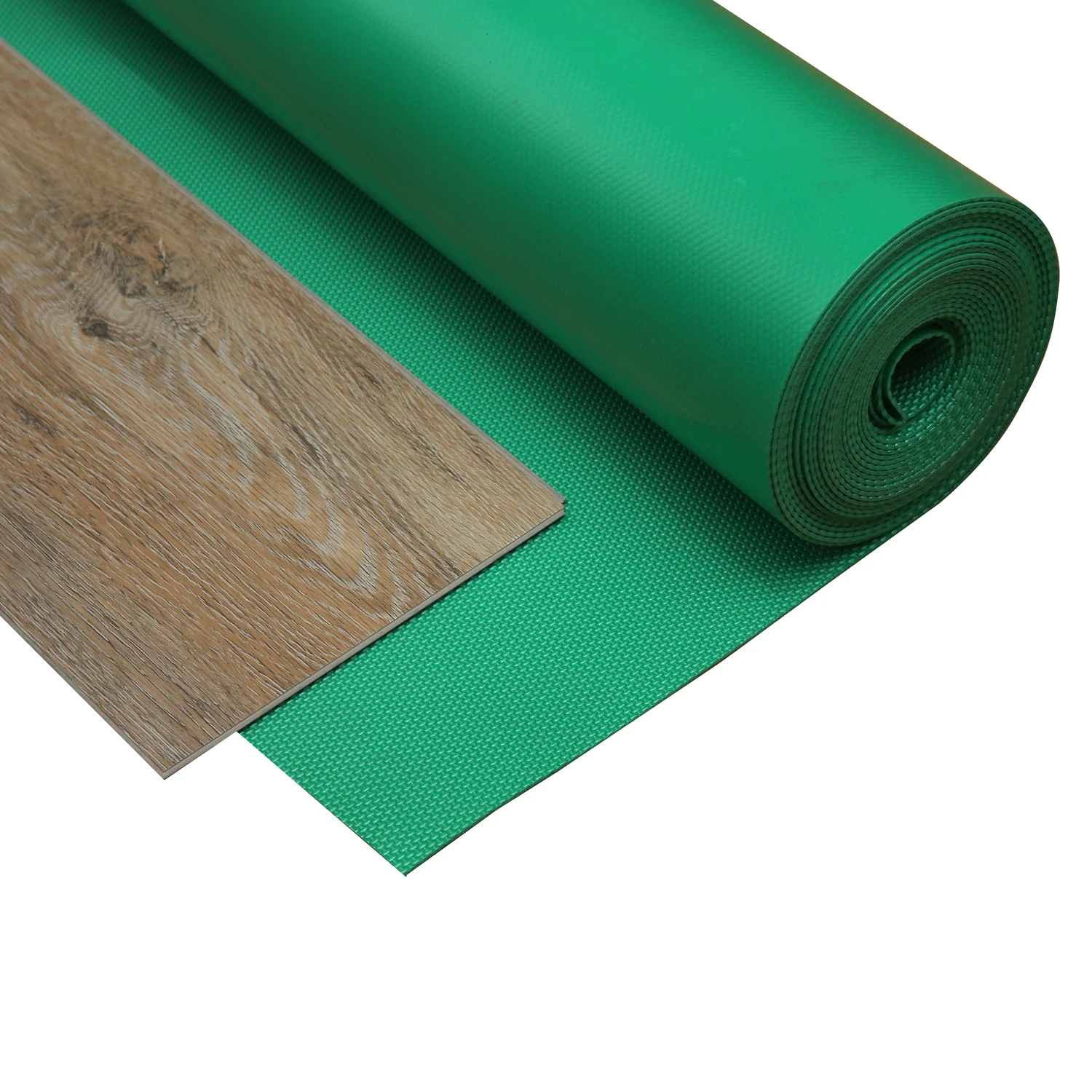Stepping into my newly renovated basement, I was excited to admire the sleek, modern vinyl plank flooring. But a nagging thought lingered in the back of my mind: “Did I need underlay for this?” The questions swirled like dust motes, a whirlwind of uncertainties about the best way to ensure a durable, comfortable, and noise-dampened floor. As I researched, I discovered that underlayment is often a crucial element when installing vinyl plank flooring, especially on concrete surfaces. But it’s not always a given, and the decision hinges on several factors.

Image: cinvex.us
This is a question many homeowners grapple with, and it’s understandable. Underlayment might seem like an unnecessary expense, but it can significantly impact the longevity and performance of your vinyl plank flooring. In this comprehensive guide, we’ll delve into the nuances of underlayment for vinyl plank flooring on concrete, explore different types, and unravel the advantages and drawbacks of each. Let’s demystify the underlayment conundrum and equip you with the knowledge to make informed choices for your home improvement project.
Understanding Underlayment for Vinyl Plank Flooring
Why Underlayment Matters
Underlayment, the often-overlooked layer beneath your vinyl plank flooring, performs a vital role in achieving a successful installation. Imagine a thin, cushioning layer nestled between the concrete and your floor. This layer is your underlayment, and it acts as a mediator, bridging the gap between the two surfaces. But its functionality extends beyond mere cushioning. Underlayment contributes to noise reduction, insulation, and even contributes to the overall stability and longevity of your vinyl plank flooring.
Underlayment Benefits for Vinyl Plank Flooring on Concrete
The benefits of underlayment, particularly on concrete, are multifaceted. Firstly, it provides a barrier against the coldness emanating from the concrete slab, enhancing the comfort and warmth underfoot. This is especially important in colder climates where the concrete floor can feel icy. Secondly, underlayment effectively reduces noise transmission. It dampens foot traffic sounds, minimizing noise traveling between floors or to adjoining rooms, contributing to a quieter and more peaceful living environment. Thirdly, for vinyl plank flooring, underlayment acts as a shock absorber, mitigating the impact of heavy furniture feet and mitigating stress on the planks. This extends the lifespan of your flooring, preventing premature wear and tear.

Image: www.alibaba.com
Types of Underlayment for Vinyl Plank Flooring
Foam Underlayment
Foam underlayment, a popular choice, offers a combination of comfort, noise reduction, and affordability. It’s available in various thicknesses and densities, each catering to specific needs. Thicker foams provide greater cushioning and sound absorption, while higher-density foams offer more support and stability. Foam underlayment is typically easy to install, often coming in rolls that can be unrolled and cut to size. However, it may compress over time and can be susceptible to moisture damage.
Cork Underlayment
Cork underlayment brings a unique set of advantages to the table. It’s known for its natural, sustainable origin and its remarkable sound-dampening properties. Cork’s cellular structure effectively absorbs sound, reducing noise levels significantly. It also provides good thermal insulation, enhancing comfort by preventing heat loss. However, cork underlayment can be more expensive than foam and might require special adhesives or fasteners for secure installation. It’s also relatively sensitive to moisture, so proper ventilation is crucial.
Rubber Underlayment
Rubber underlayment offers superior durability, excellent sound reduction, and a high level of resilience. It’s particularly well-suited for high-traffic areas, offering longlasting performance even under heavy foot traffic. It also provides superior moisture resistance, making it a good choice for areas prone to spills or humidity. However, rubber underlayment is typically the most expensive option, and its thickness can contribute to the overall height of the floor, which might affect door clearances.
Fiberboard Underlayment
While less common today, fiberboard underlayment is still used in some cases. It’s known for its affordability and can provide a degree of sound insulation and support. However, it tends to be less effective at cushioning and might not offer the same noise reduction capabilities as other types of underlayment. It’s also less moisture resistant than foam, cork, or rubber.
The Need for Underlayment on Concrete
Now that we’ve explored the benefits and types of underlayment, let’s address the key question: Do you always need underlayment when installing vinyl plank flooring on concrete? The answer, unfortunately, isn’t black and white. It depends heavily on various factors, including:
- The condition of the concrete: A smooth, level concrete surface requires less underlayment compared to a rough or uneven surface.
- The thickness of the vinyl plank flooring: Thicker vinyl planks provide some inherent cushioning, potentially reducing the need for thick underlayment.
- The intended use of the space: High-traffic areas, like kitchens or hallways, may benefit from thicker underlayment for improved durability and noise reduction.
- Personal preferences: Some homeowners prioritize comfort and noise reduction, opting for thicker underlayment, while others may focus on affordability and choose a thinner option.
Expert Tips for Choosing the Right Underlayment
Choosing the right underlayment for your vinyl plank flooring on concrete requires a thoughtful evaluation of your specific needs and preferences. Here are a few expert tips to help you navigate this decision:
1. Consider the existing condition of the concrete slab. If the concrete is rough or uneven, a thicker underlayment will be necessary to create a smooth and even surface for the vinyl plank flooring. 2. Take into account the thickness of the vinyl plank flooring. If you’re using thick vinyl planks, a thinner underlayment may suffice. 3. Factor in the intended use of the space. High-traffic areas, like kitchens and hallways, will benefit from thicker underlayment for increased durability and noise reduction. 4. Think about the climate. If you live in a colder climate, a thicker underlayment will help insulate the floor and prevent the chill from the concrete slab. 5. Don’t overlook the cost. Underlayment can vary in price, so it’s important to factor in your budget when making a decision.
FAQs on Vinyl Plank Flooring Underlayment
Q: Is it necessary to use underlayment if I have a thick vinyl plank flooring?
A: While thicker planks offer some inherent cushioning, underlayment can still be beneficial for noise reduction, insulation, and extending the lifespan of your flooring.
Q: Can I use any type of underlayment with vinyl plank flooring?
A: It’s important to select an underlayment specifically designed for use with vinyl plank flooring. Some underlayments are not compatible with certain types of flooring, so consult with the manufacturer or a flooring specialist for recommendations.
Q: Does underlayment affect the overall height of the floor?
A: Yes, underlayment, especially thicker options, can add to the overall height of the floor. Consider this when choosing an underlayment, especially if you have doors with tight clearances.
Q: Can I install underlayment myself, or do I need a professional?
A: Many underlayments are easy to install yourself, following instructions provided by the manufacturer. However, if you’re dealing with a complex installation or are unsure about any aspect of the process, it’s best to consult a professional installer.
Do You Need Underlay For Vinyl Plank Flooring On Concrete
Conclusion
Underlayment plays a crucial role in maximizing the comfort, durability, and noise-dampening qualities of your vinyl plank flooring on concrete. The type of underlayment you choose depends on various factors, including the condition of the concrete, the thickness of the vinyl planks, the intended use of the space, and your budget. By carefully considering these factors and following expert tips, you can ensure that your vinyl plank flooring installation meets your specific needs and preferences.
As you embark on your vinyl plank flooring project, remember that underlayment is not an insignificant detail. It plays a vital role in shaping the experience of your floors. Whether you’re seeking to quiet noisy footsteps, prevent excessive wear and tear, or simply add a touch of comfort, underlayment has a significant impact. So, before you lay down your flooring, invest some time in understanding the nuances of underlayment. Your feet, and perhaps your neighbors, will thank you for it!
Are you planning to install vinyl plank flooring on concrete? Do you have any questions about underlayment? Share your thoughts in the comments below!



/GettyImages-173599369-58ad68f83df78c345b829dfc.jpg?w=740&resize=740,414&ssl=1)


